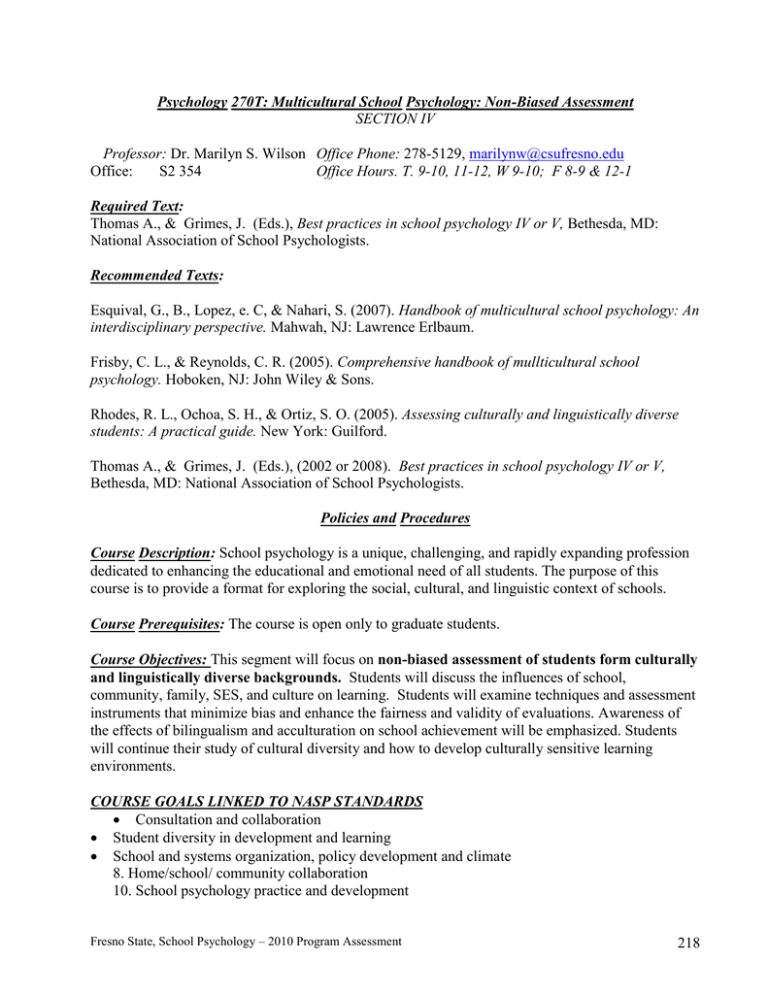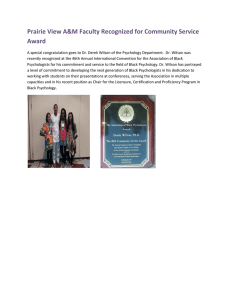Office Phone: Office: S2 354
advertisement

Psychology 270T: Multicultural School Psychology: Non-Biased Assessment SECTION IV Professor: Dr. Marilyn S. Wilson Office Phone: 278-5129, marilynw@csufresno.edu Office: S2 354 Office Hours. T. 9-10, 11-12, W 9-10; F 8-9 & 12-1 Required Text: Thomas A., & Grimes, J. (Eds.), Best practices in school psychology IV or V, Bethesda, MD: National Association of School Psychologists. Recommended Texts: Esquival, G., B., Lopez, e. C, & Nahari, S. (2007). Handbook of multicultural school psychology: An interdisciplinary perspective. Mahwah, NJ: Lawrence Erlbaum. Frisby, C. L., & Reynolds, C. R. (2005). Comprehensive handbook of mullticultural school psychology. Hoboken, NJ: John Wiley & Sons. Rhodes, R. L., Ochoa, S. H., & Ortiz, S. O. (2005). Assessing culturally and linguistically diverse students: A practical guide. New York: Guilford. Thomas A., & Grimes, J. (Eds.), (2002 or 2008). Best practices in school psychology IV or V, Bethesda, MD: National Association of School Psychologists. Policies and Procedures Course Description: School psychology is a unique, challenging, and rapidly expanding profession dedicated to enhancing the educational and emotional need of all students. The purpose of this course is to provide a format for exploring the social, cultural, and linguistic context of schools. Course Prerequisites: The course is open only to graduate students. Course Objectives: This segment will focus on non-biased assessment of students form culturally and linguistically diverse backgrounds. Students will discuss the influences of school, community, family, SES, and culture on learning. Students will examine techniques and assessment instruments that minimize bias and enhance the fairness and validity of evaluations. Awareness of the effects of bilingualism and acculturation on school achievement will be emphasized. Students will continue their study of cultural diversity and how to develop culturally sensitive learning environments. COURSE GOALS LINKED TO NASP STANDARDS Consultation and collaboration Student diversity in development and learning School and systems organization, policy development and climate 8. Home/school/ community collaboration 10. School psychology practice and development Fresno State, School Psychology – 2010 Program Assessment 218 Course Ethics: CASP, NASP, and APA Ethical Guidelines will apply to all aspects of this course. Thus, names or identities of children, parents, teachers, etc., who are observed are to be kept strictly confidential. Failure to adhere to this policy may result in a grade of F and dismissal from the course and the program. Grading: The course is credit/no credit. Readings will be assigned for each meeting. An important component of class this semester will be participation. Therefore for some classes a focus is assigned to groups for presentation. You are expected to read the materials prior to class and bring any other relevant readings to share. Attendance: Attendance is expected at all classes. However, due to potential scheduling conflicts, each student may be excused from one class session. The student missing the class will be responsible for obtaining notes and handouts for the class missed from their peers, and will need to turn in a three page paper on the topic presented to the instructor prior to our next scheduled class meeting. For each additional class a student misses, the student will be required to write an 8 to 10 page paper (APA style with a minimum of 10 references) on one of the following: (a) second language acquisition, (b) non-discriminatory assessment practices in determining special education eligibility, (c) legal cases leading to current practices in assessment of bilingual individuals. University Policies All university course policies (e.g., computers, students with disabilities, classroom disruption, cheating and plagiarism) are of course applicable to this course. Fresno State, School Psychology – 2010 Program Assessment 219 Course Schedule SESSION 1 1-3 pm SESSION 2 1- 3 pm Non-discriminatory Assessment: Ortiz, S. (2002). Best practices in nondiscriminatory assessment. In A. Thomas & J. Grimes (Eds.), Best practices in school psychology IV (pp. 1321-1336), Bethesda, MD: National Association of School Psychologists. or Ortiz, S. (2008). Best practices in nondiscriminatory assessment. In A. Thomas & J. Grimes (Eds.), Best practices in school psychology V (pp. 661-678), Bethesda, MD: National Association of School Psychologists. To Assess or Not: Language Acquisition, Stereotypes, Teacher Expectations, and Referrals All read the Skiba et al. article. Rhodes et al. highly recommended. Skiba, R. et al. (2006). The Context of Minority Disproportionality: Practitioner Perspectives on Special Education Referral. Teachers College Record, 108, 1424-1459 (Full text available through our library) Prereferral considerations for culturally and linguistically diverse students (in Rhodes, Ochoa, & Ortiz, pp 76-90). Scribner, A. (2002). Best assessment and intervention practices with second language learners In A. Thomas & J. Grimes (Eds.), Best practices in school psychology IV (pp. 1485-1500), Bethesda, MD: National Association of School Psychologists. Canino, I., & Sprulock, J. (2000). The influence of culture and multiple social stressors on the culturally diverse child. In Culturally diverse children and adolescents: Assessment, diagnosis, and treatment (pp. 7-44). New York: Guilford Press. Each group will make a 15 minute PowerPoint presentation on barriers and strengths children from various cultures located in the Central Valley may experience as they enter school. Consider language, acculturation, parental expectations, and family support. Please email the presentation to me and the class. (You will sign up for a group at our 1st class) Group 1: Asian American Group 2: African American Group 3: Hispanic / Mexican American Group 4: Middle East and/or Indian Group 5: Caucasian (English only, consider SES) SESSION 3 Interpreters and Interviews: Read at least one article from the following. Fresno State, School Psychology – 2010 Program Assessment 220 1-3 pm The use of interpreters in the assessment process and school-based practices. (in Rhodes et al, pp. 91-102) The interview process: Practical guidelines. In Rhodes et al, pp. 103-123. Lopez (2002). Best practices in working with school interpreters. Information on use of interpreters will be presented in class. In A. Thomas & J. Grimes (Eds.), Best practices in school psychology IV (pp. 1419-1432), Bethesda, MD: National Association of School Psychologists. Lopez (2008). Best practices in working with school interpreters. Information on use of interpreters will be presented in class. In A. Thomas & J. Grimes (Eds.), Best practices in school psychology V (pp. 1751-1770), Bethesda, MD: National Association of School Psychologists. SESSION 4 Assessment and Eligibility of Linguistically Diverse Students 1-3 pm Use the following resources and other relevant materials. Conceptual measurement and methodological issues in cognitive assessment of culturally and linguistically diverse individuals. In Rhodes et al., pp 153-167. Cognitive assessment of culturally and linguistically diverse students. Vazquiz-Nuttall et al. (2007). In Esquival, Lopez, & Nahari (Eds.) Handbook of multicultural school psychology, pp. 265-288. Personality and behavioral assessment: considerations for culturally and linguistically diverse individuals. Kohn, Scorcia, & Equival (2007) in Esquival, Lopez, & Nahari (Eds.) Handbook of multicultural school psychology, pp. 289308. Academic assessment of bilingual and English-language learning students. Martines & Rodriguez-Srednicki (2007). Esquival, Lopez, & Nahari (Eds.) Handbook of multicultural school psychology, pp. 381-408. Each group will examine the research on appropriate measures or adaptations to use when assessing culturally or linguistically diverse students and make a 15-20 minute PowerPoint presentation for the class: Email to all of us, please. Include a reference list. Group 1 – Cognitive measures – nonverbal, traditional verbal, and instruments available in Spanish or other languages. Group 2 – Academic measures – both traditional norm referenced test and curriculum based assessment Group 3 – Adaptive behavior measures and appropriate interview questions for teachers, parents, and students. Group 4 – Social emotional assessment of diverse students Fresno State, School Psychology – 2010 Program Assessment 221



